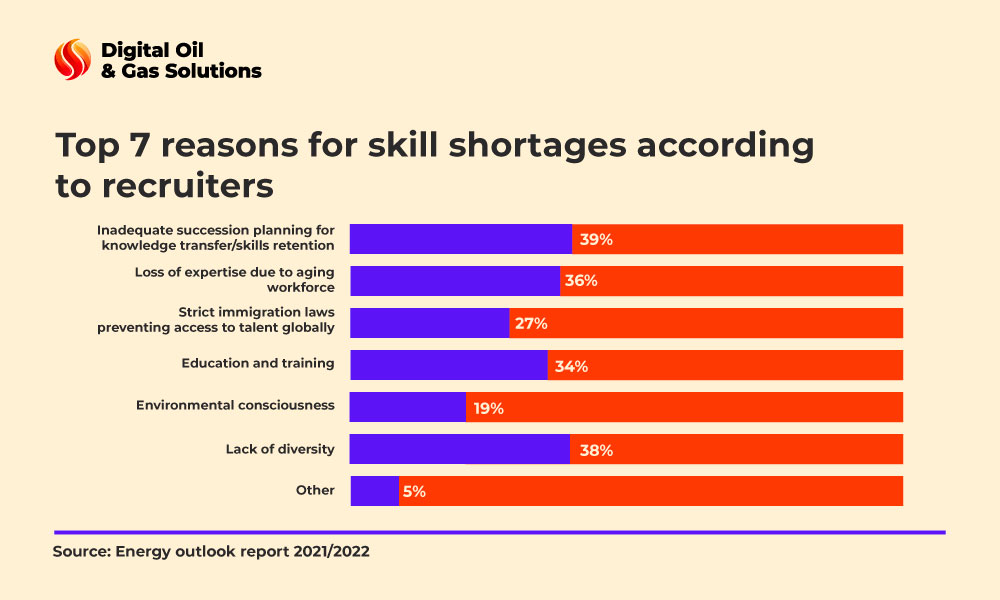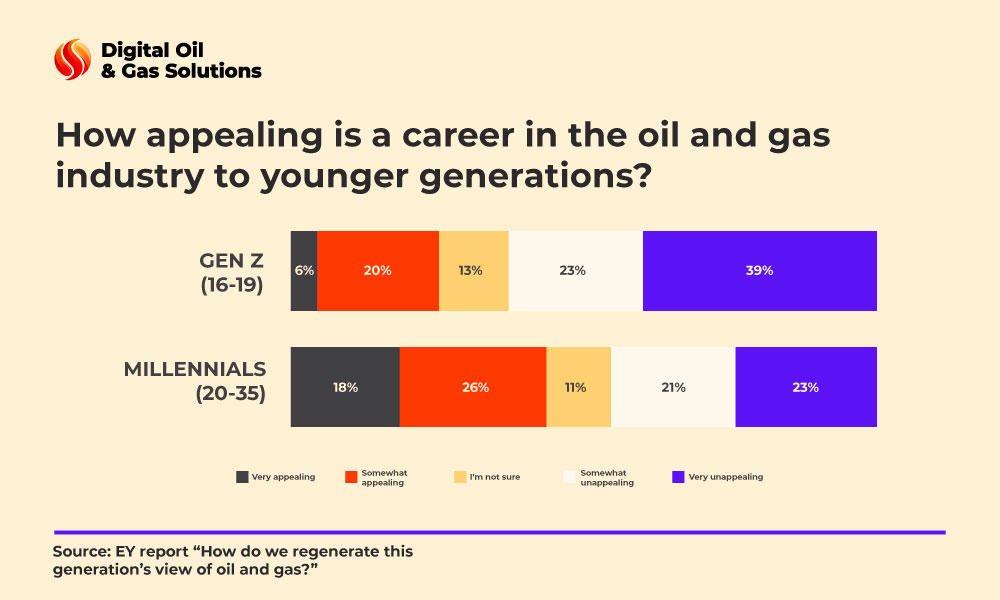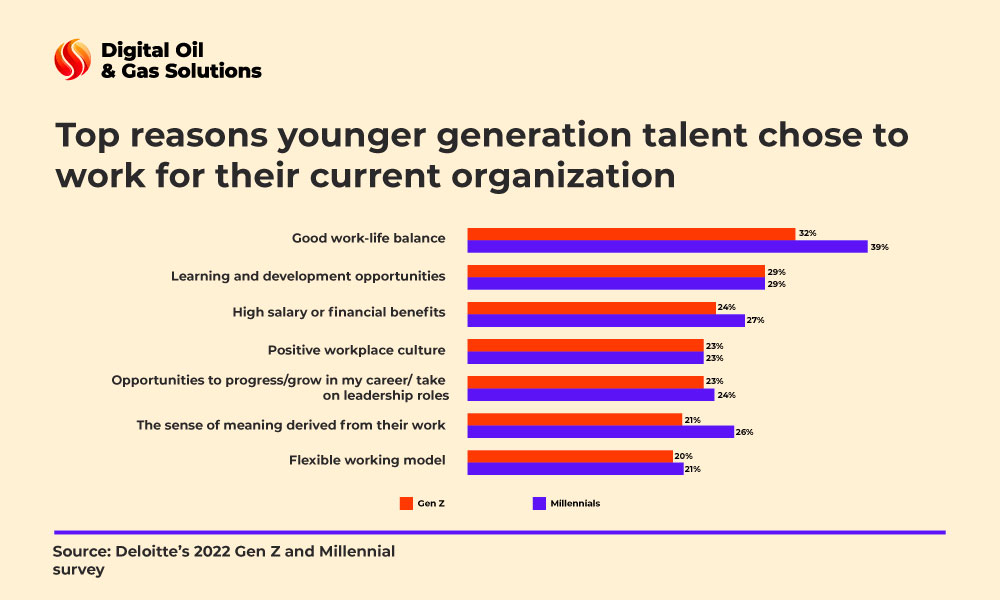To adapt, business leaders develop new employee onboarding and retaining strategies and introduce other oil and gas talent trends 2022 described in our blog. Meanwhile, understanding the evolving perceptions within the workforce will be vital to prepare for upcoming transformations in approaches and principles of talent development oil and gas companies use.
Top 4 talent management and acquisition trends to follow
But before we discuss the new processes that managers should introduce for effective talent retention and development, let’s outline the key oil and gas talent trends 2022. They will help you understand the new priorities of the ever-more purpose-driven professionals and what activities you should focus on first.
1. The rising need for tech and digital skills
We can see that data analytics platforms, industrial IoT, and cloud computing continue driving advancements in the sector. This galloping digitalization has shifted the emphasis toward digital skills. Yet, 43% of organizations are trying to deal with the global IT expert shortage. So, forward-looking leaders continue upskilling the existing workforce and introduce workable tactics to overcome skill gaps and mitigate oil & gas talent shortage risks.
2. Immersive training embedded in the workflow
The industry widely adopts virtual reality and digital twin technology to take employee training to the next level. Today, workers can undergo no-risk simulations of actual field activities before doing them in real life. Computer simulation is an effective tool to train personnel in everything from drilling techniques to soft skills. So, it’s no surprise that virtual training is one of the biggest oil and gas talent trends 2022. It can help you to not only facilitate employee onboarding and improve retention but also streamline the acquisition of new competencies and skills.
3. Signs of the US oil and gas employment recovery
The American labor market can benefit and grow amid the rising oil prices and positive market sentiment. The United States is aggressively increasing production and expanding LNG export to the EU buyers disrupted by Russia’s invasion of Ukraine.
So, the US oil and gas employment market is projected to revive and grow by 12.5%, totaling 970,000 jobs by the end of 2022. Nearly half of the jobs lost during the pandemic have already been recovered. Yet, gone are the days when oil and gas talent hiring was easy and even despite higher wages, not so many workers are responding.
4. The labor market shift and talent shortage
A dismal 2020 terminated over 120,000 energy jobs in the USA. Is it any wonder that the energy sector is in a labor crunch today after it has sent nearly half its workforce home?
Many oil and gas workers left the industry and switched to more stable renewables or manufacturing, where the transition seemed natural. Some also opted for technology and digital sectors that offer high wages and good benefits. But the most important issue is that they are hesitant to come back.
Drilling and well delivery (14%) and geoscience (12%) are the most challenging roles to fill. The industry endures hard times attracting younger people to replace retiring professionals who represent nearly half of energy personnel. Add to this the oil and gas industry poaching from rival firms, and we have a nearly desperate situation for talent development oil and gas companies to solve.

Why attracting younger talent requires updated messaging
Younger generations perceive the oil and gas industry as negative and archaic. Around 62% of Gen Z and 14% of millennials reject the idea of career building in the energy sector. As these younger generations make up 46% of the current US workforce, it’s up to leaders to pitch new approaches to talent development oil and gas companies that they should implement.

Keep in mind that the sector must compete with other industries that seem more attractive to millennials. So, you should revamp your organization and cultural constructs to meet the younger generation’s needs and challenge their damaging misconception that the industry is digitally phobic.
Winning approaches to talent development oil and gas companies should use
- Maximize the use of technology to enable more remote work
Young people are digitally focused talents interested in industries that tech solutions will influence the most. So, focus corporate communication on your digital endeavors and technological profoundness.
Tell your potential young employees how digital transformation is sweeping through your company and how they can lead the change using monitoring systems, IIoT, data analytics, and business automation. The wider use of remote technologies and telecommuting tools like video calls that enable effective remote work are viable for younger professionals. - Make sustainability your core business value
ESG is a vital factor that influences career decisions of 85% of oil and gas professionals. The perceptions and desires of your workforce and potential hires should be on your company’s radar if you want to recruit the best talent.
So, place sustainability at the core of your corporate values to demonstrate commitment to this crucial issue. Create an ESG strategy, invest in sustainable technology solutions, and set purposeful goals that resonate with your employees. For instance, BP oil and gas enterprise is working on climate change transition and its reinvention by shifting to renewable energy sources. - Highlight career opportunities
From the outside, the industry can be perceived as a market with little room for growth. But this doesn’t have to be the case. Invest in building transparent career paths and a structured salary scheme for newcomers. Meanwhile, help the existing workforce discover and understand their career opportunities.
You can also follow a more flexible labor strategy so young workers can gain diverse skills in various roles. Offer them space to pursue their passions and give decision-making authority and leadership opportunities. By doing so, you will help them shape a personalized path forward and grow a new generation of field professionals. Emphasize that in your messaging and show potential hires the future of talent in oil and gas and a prospective career with your company.

- Promote flexibility and work-life balance
Younger generations expect greater workplace flexibility and seek organizations that welcome this new way of working. So, consider what a flexible working environment can mean within the constraints of business operations.
You can implement hybrid work conditions for office workers, allowing them to work several days a week remotely. Also, we recommend giving more control to employees over their schedule so that they can work in a way suitable for them. This will not only build value but create ownership. Less than 1% of oil and gas organizations offer flexible workplace options, so take advantage of these oil and gas talent trends 2022 and thrive. - Enter a pool of professionals outside oil and gas
Leverage remote work strategies and modern tech solutions to expand your recruitment capacity to professionals worldwide. The existing workers retire, and industry shifts require new skill sets, so look for younger recruits or consider hiring oil and gas talent hiring consultancy experts. As a company offering diverse consulting services, we help our clients transform into tech-savvy and people-centered organizations that win despite a tight labor market.
The takeaway
Following these oil and gas talent trends 2022 can significantly improve workforce retention and your company employee brand image. It’s essential that organizations match the pace of these rapid shifts to future-proof the jobs pipeline with young professionals while retaining the expertise of industry veterans for a smooth knowledge transfer.
To make this happen, you should initiate internal changes to corporate culture and put much effort into reshaping millennials’ perceptions of the industry. So, don’t be surprised if you may need the help of consulting experts who will guide and support you in the transformation era.






